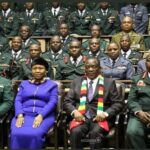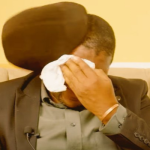BULAWAYO – Zimbabwean football was thrown into turmoil yesterday as Highlanders supporters, known as Bosso fans, staged a mass boycott of their team’s 2-0 victory over ZPC Kariba at Barbourfields Stadium.
This unprecedented action was a powerful protest against what supporters describe as rampant match-fixing, corruption, and criminality within the sport, allegedly involving some club owners and football authorities.
Bulawayo giants Highlanders Football Club supporters today took an unprecedented action to boycott their own team's 2-0 Castle Lager Premier Soccer League (PSL) win over ZPC Kariba at Barbourfields Stadium
in protest against local football authorities for what they say is unfair… pic.twitter.com/4tIOyq73Pc— TheNewsHawks (@NewsHawksLive) October 6, 2024
The boycott followed a controversial Chibuku Super Cup quarter-final match against Simba Bhora. A last-minute penalty awarded to Simba Bhora, despite the infringement clearly occurring outside the penalty area, sparked outrage. Highlanders players refused to continue the match, leading to its abandonment and a subsequent US$6 000 fine imposed on the club by the Premier Soccer League (PSL). The referees involved were suspended.
This decision by the PSL, chaired by Farai Jere, with Kennedy Ndebele as CEO, infuriated Bosso fans, who viewed it as further evidence of the systemic corruption they allege plagues Zimbabwean football. The Zimbabwe Football Association (Zifa) Normalisation Committee, led by Lincoln Mutasa, also faces criticism from the supporters for its perceived inaction in addressing these issues.
The boycott was not a spontaneous event; it was a carefully planned demonstration of the fans’ discontent. Bosso supporters decided to use the money they would have spent on match tickets to raise funds to pay the US$6 000 fine levied against their beloved club. A fundraising initiative was organised, with supporters agreeing to contribute at least $3 each towards the fine at a meeting at the club house.
The Highlanders Football Club itself has expressed solidarity with its fans’ actions. In a video circulating on social media, club CEO Sihlangu Dlodlo revealed the club’s support for the boycott, stating that the charges against the club and its players were unfair. This public show of support from the club’s leadership further highlights the depth of feeling surrounding the issue of corruption within Zimbabwean football.
The boycott presented an unprecedented dilemma for football governing officials. The empty stands at Barbourfields Stadium served as a stark visual representation of the fans’ anger and frustration.
The unusual sight of fundraising efforts to cover a fine imposed for protesting against alleged corruption further underscores the gravity of the situation. The incident has thrown a spotlight on the need for transparency and accountability within Zimbabwean football governance.
The silence from the football authorities in the face of such a powerful display of public dissent is deafening and raises further questions about the governance of the sport in Zimbabwe.












